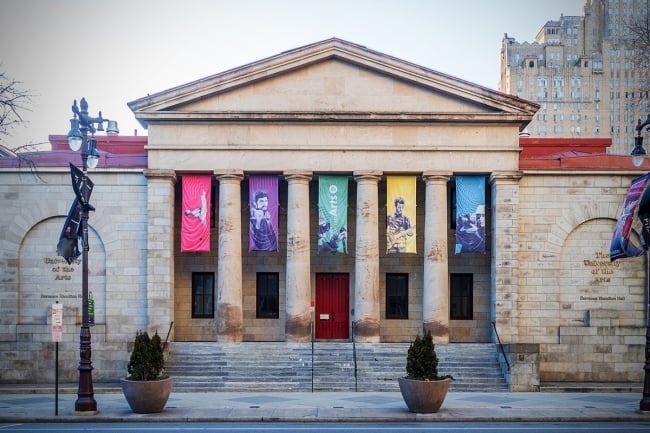You have /5 articles left.
Sign up for a free account or log in.

Wikimedia Commons/ajay_suresh
The University of the Arts, a private nonprofit institution in Philadelphia, announced late Friday that it would close on June 7.
The institution’s announcement came hours after the Middle States Commission on Higher Education withdrew its accreditation, saying UArts had “failed to inform the commission of closure in a timely manner or to properly plan for closure with prior approval through substantive change.”
“[T]he commission has determined that an immediate adverse action is necessary because the institution has not complied with the commission’s procedures, requests for written reports, teach-out plan, or other information,” Middle States said in its May 31 letter to President Kerry Walk. Accreditors have increasingly insisted that institutions facing significant financial turmoil keep their overseers informed and prepare plans for students to transfer to other institutions, among other things.
For their part, University of the Arts officials had relatively little to say.
“We know that the news of UArts’ closure comes as a shock,” Walk and the university’s board chair, Judson Aaron, said a letter to the campus Friday. “Like you, we are struggling to make sense of the present moment. But like many institutions of higher learning, UArts has been in a fragile financial state, with many years of declining enrollments, declining revenues, and increasing expenses.”
The officials said that the institution had “worked hard this year … to take steps that would secure the university’s sustainability,” but that “we could not overcome the ultimate challenge we faced: with a cash position that has steadily weakened, we could not cover significant, unanticipated expenses. The situation came to light very suddenly. Despite swift action, we were unable to bridge the necessary gaps.”
Sunday, the institution’s Board of Trustees released another statement affirming the closure, which they approved Saturday.
“Under extraordinary circumstances, we diligently assessed the urgent crisis presented and pathways to keep the institution open,” the statement read. “Despite our best efforts, we could not ultimately identify a viable path for the institution to remain open and in the service of its mission. With the priority of addressing the impact that our decision will have on the UArts community, as well as our home in the City of Philadelphia, we are committed to supporting our students, faculty, and staff through this heartbreaking transition.”
A spokesman did not respond to a reporter’s questions about the Middle States agency’s assertions about UArts’s failure to follow the accreditor’s policies.
Walk, who became the university’s president last year, was previously president of Marymount Manhattan College, which last week was absorbed by Northeastern University.
She told The Philadelphia Inquirer that she first became aware of a significant cash flow problem on May 14. “We had unanticipated expenses we had to cover with cash,” she told the newspaper. “At the same time, some of the deposits [including gifts, grants, and other revenue] we expected into that bank account were late and just didn’t come in.”
Local news reports quoted employees and students expressing shock and dismay at the sudden closure.
”They’ve made no communication to the union about even the possibility of this,” Daniel J. Pieczkolon, president of United Academics of Philadelphia, a labor union, told The Philadelphia Inquirer.
Several colleges in and around Philadelphia have ended independent operations in the last year. The Pennsylvania Academy of the Fine Arts said in January that its art school would close, and Cabrini University closed and Salus University merged into Drexel University in the middle of 2023.
The following institutions have announced in 2024 that they will close or, if indicated, merge into another university such that it will no longer be considered an independent institution.
- Delaware College of Art and Design, Delaware
- Oregon College of Oriental Medicine, Oregon
- Eastern Gateway Community College, Ohio
- Wells College, New York
- University of Saint Katherine, California
- Goddard College, Vermont
- Oak Point University, Illinois
- Birmingham-Southern College, Alabama
- University of Wisconsin at Milwaukee, Waukesha campus
- Bluffton University (merging into University of Findlay), Ohio
- Cambridge College (merging into Bay Path University), Massachusetts
- Fontbonne University, Missouri
- Notre Dame College, Ohio
- Jamestown Business College, New York









